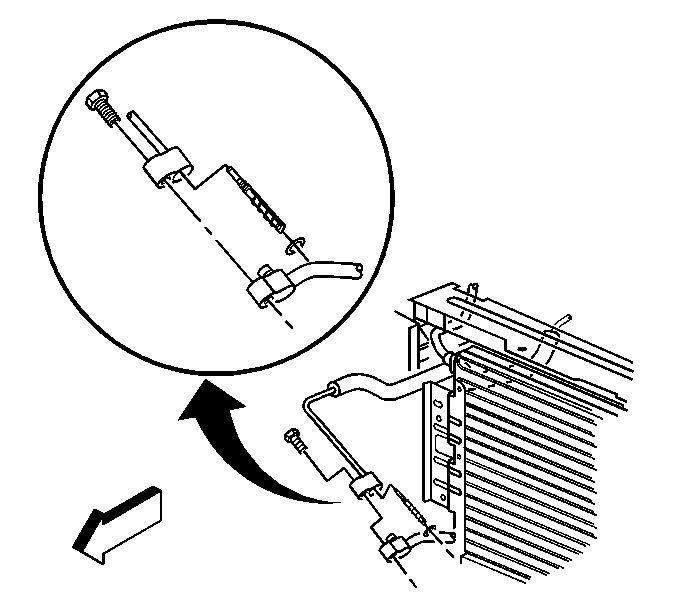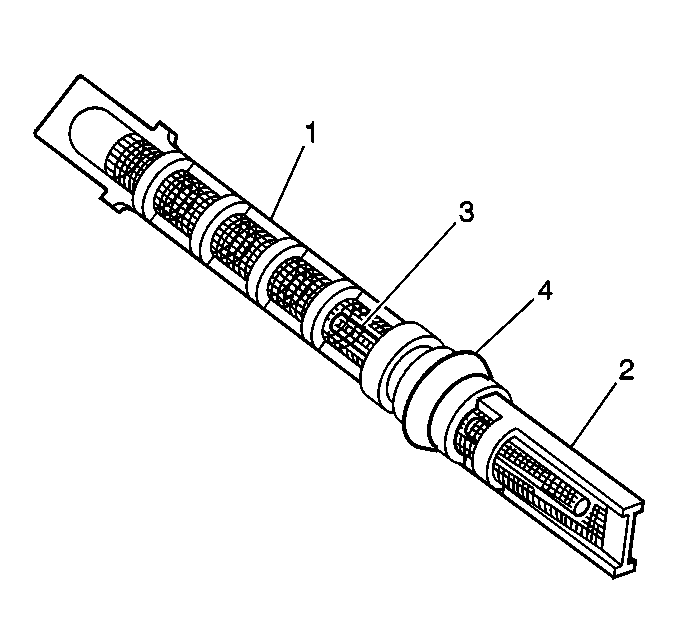The expansion (orifice) tube is located at the condenser
to evaporator hose connection in the evaporator hose.
Important: When you replace an expansion (orifice) tube, compare the design of
the orifice tube to the design of the replacement part for the correct selection.
The different styles of orifice tubes are not interchangeable.
Removal Procedure

- Recover the refrigerant.
Refer to
Refrigerant Recovery and Recharging
.
- Raise the vehicle. Refer to
Lifting and Jacking the Vehicle
in General Information.
- Remove the bolt holding the evaporator hose assembly to the condenser.
- Remove the evaporator hose assembly from the condenser.
Important: Cap or tape the open end of the condenser line immediately to prevent
contamination.
- Remove and discard the O-ring seal.
- Using needle nose pliers, CAREFULLY grasp the edge of the expansion
(orifice) tube without touching the filter screen and pull to remove the tube;
cap or tape the evaporator tube to prevent contamination.
- Use the following procedure in order to remove a restricted or
plugged expansion (orifice) tube:
| 7.1. | Remove as much as possible of the impacted residue. |
| 7.2. | Use a heat gun in order to apply heat to the expansion (orifice)
tube. Apply the heat approximately 7 mm (1/4 in) from the
dimples on the inlet pipe. |
| 7.3. | While applying heat, use needle-nosed pliers in order to grip
the orifice tube. Use a turning motion along with a push-pull motion. |
This will loosen the impacted orifice tube and remove the tube.
| 7.4. | Swab the inside of the evaporator inlet line to clean any contamination
from the line. |

- Inspect the expansion
(orifice) tube for the following conditions and clean or replace with a new
tube as indicated:
| • | Broken plastic frame; replace tube |
| • | Filter screen (1,2) torn, damaged or plugged with fine gritty
material; replace tube |
| • | Brass orifice tube (3) damaged or plugged; replace tube |
| • | Filter screen (1) coated with metal chips, flakes, or slivers;
coating may be removed with low pressure shop air and reused if cleaned satisfactorily |
| • | If reusing the tube, install a new O-ring (4) |
Installation Procedure

- Lightly coat the new orifice
tube O-ring seal (4) with mineral base 525 viscosity refrigerant oil.
- Remove the cap or tape from the evaporator line.
- Using needle-nose pliers, CAREFULLY grasp the edge of the expansion
(orifice) tube (long filter screen (1) inlet side of tube) without touching
the filter screen and insert the tube (short filter screen (2) outlet side
first) fully into the evaporator line.
- Remove the cap or tape from the condenser line.
- Using a lint-free clean, dry cloth, carefully clean the sealing
surfaces of the line fittings.

- Install a NEW O-ring seal
on the condenser tube.
Coat the O-ring seal with 525 viscosity refrigerant oil.
Notice: Use the correct fastener in the correct location. Replacement fasteners
must be the correct part number for that application. Fasteners requiring
replacement or fasteners requiring the use of thread locking compound or sealant
are identified in the service procedure. Do not use paints, lubricants, or
corrosion inhibitors on fasteners or fastener joint surfaces unless specified.
These coatings affect fastener torque and joint clamping force and may damage
the fastener. Use the correct tightening sequence and specifications when
installing fasteners in order to avoid damage to parts and systems.
- Install the evaporator
hose assembly and the bolt to the condenser.
Tighten
Tighten the bolt to 25 N·m (18 lb ft).
- Lower the vehicle.
- Evacuate and recharge the A/C system. Refer to
Refrigerant Recovery and Recharging
.
- Inspect the system operation.
- Perform the leak test. Refer to
Leak Testing
.




